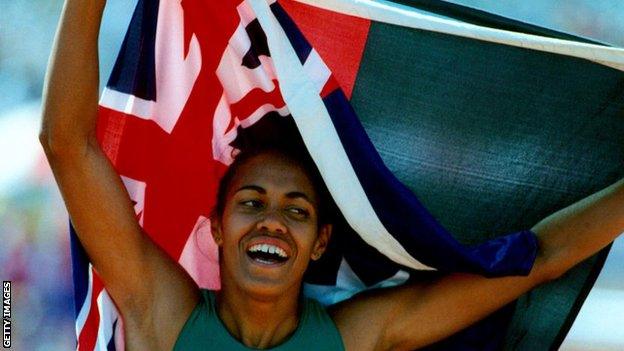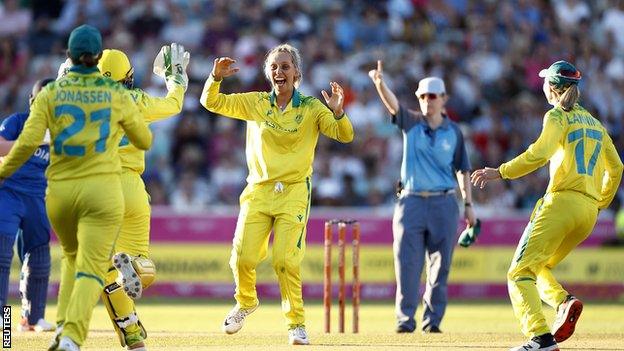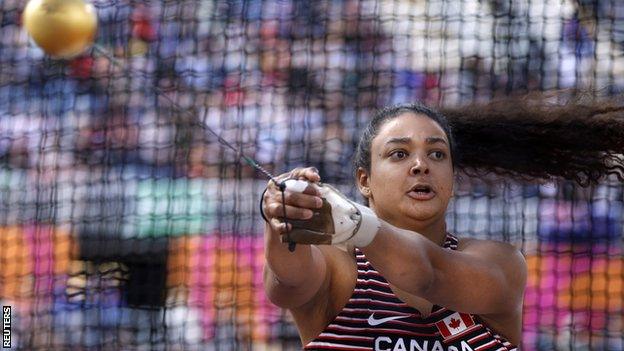Commonwealth Games: What has changed for indigenous people since Cathy Freeman's triumph?
- Published

Cathy Freeman in 1994 with both the Australia and Aboriginal flags after winning the 400m final during the Commonwealth Games in Victoria, Canada
As the curtain came down on the Commonwealth Games in Birmingham, eyes began to turn to Victoria - the host of the 2026 event.
Indigenous elders from Australia performed a smoking ceremony as the Birmingham Games came to a close - handing over message sticks to organisers.
It was a moment of inclusion that underlined how things have changed since Australian sprinting legend Cathy Freeman won gold at the 1994 Games.
She was 21 then and having a breakthrough year in athletics. At the Commonwealth Games in British Columbia she won both the 200m and the 400m, but during those Games, she experienced something that would become part of sporting history.
Freeman celebrated her 400m win by running a victory lap while carrying the Aborginal flag. Australia's chef de mission for the Games, Arthur Turnstall, responded with a public statement reprimanding her and warned if she did it again, she would be sent home.
"She should have carried the Australian flag first up, and [we should have] not seen the Aboriginal flag at all," he told media.
Defiantly, after winning the 200m days later, Freeman once again carried the Aboriginal flag, this time tied with the Australian flag, to represent her identity and heritage.
Freeman's success on the track and passion to represent her people off it made her an Aboriginal icon, as well as a symbol of reconciliation between indigenous and non-indigenous Australians.
That was nearly 30 years ago.
So how much have things changed for Indigenous athletes competing at the 2022 Commonwealth Games, and what does the event mean to them?
'Superstar Freeman made things seem achievable'
Ash Gardner was part of the gold medal-winning Australian cricket team at Birmingham. She told BBC Sport her heritage and culture plays a huge part in her identity as a cricketer.
"I'm a proud Marwari woman," she said. "I love being able to represent not only myself, but my culture and my people as well."
Gardner says while she didn't have many Aboriginal role models growing up, Freeman was certainly one of them.
"She was an absolute superstar in her field, and you just have to look up to those types of people and know that things are achievable," added the 25-year-old.
"Wearing that flag was something that was pretty incredible, and something that she should be really proud of. Knowing the backlash that she copped, and still sticking to her guns, was a really significant thing.
"It's who the First Nations people of Australia are and that's who was there before anyone else."
So, before coming to an event like the Commonwealth Games, which has such strong links to colonialism, did Gardner think about its history?
"It certainly crossed my mind," she admitted. "You just have to look at the history of Australia and what happened there and knowing that, obviously a lot of that has come from colonisation. I think a lot of people probably don't understand that.
"But we can look at it and celebrate who the First Nations people are from all different countries around the world, especially Commonwealth countries."

Australia's Ash Gardner, centre, celebrates during the gold-medal match against India at the Birmingham Commonwealth Games
But for Indigenous people all over the world, what exactly are the barriers to playing sport?
Janice Forsyth, professor in the Faculty of Education at the University of British Columbia, specialises in sport's relationship to Indigenous and Canadian culture.
"Sport is very expensive, it costs a lot of money, and many Indigenous families don't have that kind of money," she told BBC Sport.
"In addition, there's racism and other forms of discrimination that make it an unwelcoming place for indigenous athletes.
"And the discrimination can be overt, with name calling, or it can be much more subtle. A lot of times, people just don't know how to address it, because it is so systemic."
Another reason there are so few Indigenous elite athletes, she says, is because their communities were trying to address the colonialism and the generational trauma of it in their everyday lives.
"Many athletes in the mainstream system, especially those who are privileged, didn't have to experience that."
Ash Gardner says that can be "taxing".
"We feel like we have to educate everyone on who we are and what our issues are," she added.
"Obviously it's up to people to go and do their own research. But I guess the thing that's changing in Australia at the moment is people are actually going out there and educating and it's coming from the top."
'I want to bring attention to some of the wrongdoings'

Canada's Jillian Weir took bronze in the women's hammer throw in Birmingham
Another Indigenous athlete who competed and won a medal at the Commonwealth Games is hammer thrower Jillian Weir from Canada.
Weir's dad Robert was born in Birmingham and competed for Birchfield Harriers. He was a 12-time British champion in the discus and won four Commonwealth Games medals over a 20-year period, including two golds.
While Robert has Jamaican roots, Weir's mum has Indigenous Canadian heritage.
"There's a fighter spirit in me from my ancestors," she told BBC Sport.
The 29-year-old says looking at the Games from a historical point of view is difficult.
"I come into this as another competition," she added. "And I want to do my best to represent my background as best as I can.
"But I remember in 2018 there were people protesting, external the colonisation of the Commonwealth Games, and it definitely made me think about that when I made my first Commonwealth team.
"To have an Indigenous background and to be here, to medal at the Commonwealth Games, it means the world.
"I'm just trying to represent the best that I can and if I can bring attention to some of the wrongdoings of indigenous people, that's what I want to do. To highlight indigenous backgrounds and indigenous stories."
Like Gardner, Weir also sees the barriers that Indigenous athletes face in her country, including lack of representation and opportunities.
"And typically indigenous people - especially the ones that still live on reservations in Canada - maybe don't have the highest socio-economic status," she added. "To be able to go join a sport and to pay money to be able to participate can be quite difficult."
The history
Forsyth says the issues of indigenous people in sport can be traced all the way back to when European settlers first arrived in North America with their own sports and games.
"They thought those were the sports and games that Indigenous people should be playing in Canada, the United States and Australia," she said. "And so they tried to encourage indigenous people to pick up those sports.
"They did this in a number of ways. In Canada, they did it through the Indian Act, outlawing indigenous physical practices. They did it through the boarding schools and the residential schools. They continue to do it by funding certain sports which aren't necessarily indigenous derived."
Forsyth says laws which divorced indigenous people from their own culture are another reason there are still so few indigenous athletes in mainstream sports.
Now, new conversations are being had and on global sporting stages - but could Freeman ever have imagined this would happen in her lifetime?
On the day of her 400m final, a crowd of 112,524 - the then-largest Olympics attendance - packed the stadium to watch Freeman storm to victory in one of the most iconic races - and bodysuits - in Games history.
She was not only the first Aboriginal Australian woman to compete in the Olympics, she also became the first Aboriginal athlete to win an individual gold medal too.
She celebrated with her double-sided Australian-Aboriginal flag and, after her win, she said "My ancestors were the first people to walk on this land.
"It's a really powerful force and those girls were always going to come up against my ancestors."